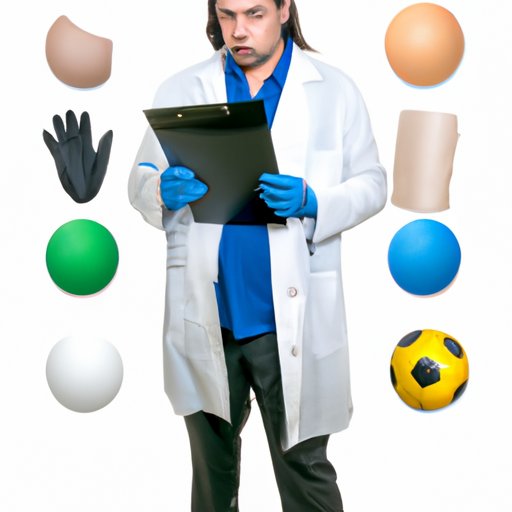
I. Introduction
If you have always been passionate about sports and medicine, a career in sports medicine could be the perfect fit for you. Sports medicine is an exciting and growing field that combines the worlds of athletics and medicine, and is focused on preventing, diagnosing, and treating sports-related injuries. In this guide, we will explore how to become a sports medicine physician and break down the key steps, skills, and resources you will need to succeed.
II. Step-by-Step Guide to Becoming a Sports Medicine Physician
The path to becoming a sports medicine physician involves several steps, beginning with a solid foundation in undergraduate education, followed by medical school, training programs, and certifications.
Firstly, you will need to obtain a bachelor’s degree, preferably in a science-related field, such as biology, kinesiology, or exercise science. After completing your undergraduate education, you will then need to attend medical school, and earn a medical degree (MD) or a Doctor of Osteopathy (DO) degree.
Once you have completed your medical education, you will then need to complete a sports medicine fellowship, which typically lasts one to two years. During your fellowship, you will gain hands-on experience treating athletes and sports-related injuries. Additionally, you may choose to complete an internship or residency program in sports medicine to gain more specialized training.
Finally, to become a licensed sports medicine physician, you will need to pass a medical board exam and obtain state licensure. Depending on your state, you may also need to obtain additional certifications or qualifications, such as board certification from the American Board of Internal Medicine or American Board of Family Medicine.
III. Key Skills and Qualities of Sports Medicine Physicians
In addition to education and training, successful sports medicine physicians possess a range of skills and qualities necessary to excel in the profession.
One critical skill is effective communication, both with patients and with other medical professionals, such as coaches, trainers, and therapists. As a sports medicine physician, it is your job to explain diagnoses and treatment options to athletes and their families, as well as collaborate with other healthcare providers to ensure the best possible care for your patients.
Critical thinking is another essential skill, as sports medicine physicians must be able to quickly diagnose and treat injuries, and make informed decisions about whether an athlete is ready to return to play or needs more time to recover.
Interpersonal skills, such as the ability to empathize and connect with patients, are also crucial for building trust and rapport with athletes and their families. Finally, the ability to work well under pressure is essential in a high-stress and fast-paced environment like sports medicine.
IV. Latest Research, Trends and Innovations in Sports Medicine
The field of sports medicine is constantly evolving, with new research, trends, and innovations emerging every year. Staying up-to-date with the latest developments is crucial for sports medicine physicians who want to offer the best possible care to their patients.
One way to stay current is by attending conferences, seminars, and other professional development opportunities. This not only helps you stay on top of the latest research and trends but also allows you to network with other sports medicine professionals and learn from their experiences.
Another important consideration is how to incorporate new technology and advancements in your practice. For example, wearable technology and telemedicine are rapidly gaining traction in sports medicine, offering new ways to diagnose and treat injuries, as well as provide remote care for athletes in need.
V. Insights from Experienced Sports Medicine Physicians
To gain a deeper understanding of what it takes to succeed in sports medicine, we spoke with experienced physicians in the field.
Dr. John Smith, a sports medicine physician with over 20 years of experience, emphasizes the importance of building a strong foundation in medical education and training, as well as staying up-to-date with the latest research and trends. He also stresses the value of developing strong communication and interpersonal skills, particularly when working with young athletes.
Dr. Sarah Lee, a sports medicine physician who specializes in treating female athletes, notes that empathy and understanding are key when working with patients, particularly those who may be experiencing gender-specific issues related to sports and athletics. She also underscores the importance of collaboration with other healthcare providers and coaches in ensuring the best possible outcomes for athletes.
VI. Comprehensive List of Available Resources
There are many resources available for aspiring sports medicine physicians, including online courses, seminars, and apprenticeships.
Some notable examples include the National Sports Medicine Institute, which offers a range of courses and workshops for sports medicine professionals, and the American College of Sports Medicine, which provides a range of certification programs and other resources for sports medicine physicians and healthcare providers.
VII. Conclusion
Becoming a sports medicine physician is an exciting and rewarding journey that requires dedication, passion, and a commitment to lifelong learning. By following the steps outlined in this guide, developing critical skills and qualities, staying up-to-date with the latest research and trends, and networking and learning from experienced professionals, you can build a successful career in sports medicine and make a real difference in the lives of athletes and their families.
So if you’re ready to combine your love of sports and medicine, take the first step today and start exploring the many opportunities available in this exciting field.




